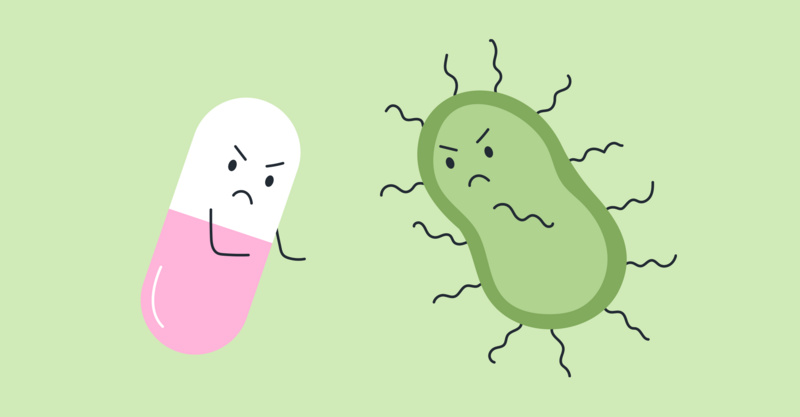Key Points
- UTIs are common bacterial infections affecting the urinary system, with symptoms like painful urination and frequent urges to urinate.
- Urgent care clinics offer prompt, non-emergency treatment for UTIs, but severe cases may require an emergency room visit.
- Natural remedies like cranberry juice and probiotics may not effectively treat UTIs, and antibiotic resistance is a growing concern.
A urinary tract infection (also called a “bladder infection” or “UTI”) is a common bacterial infection that can affect anyone at any age. Women, however, are more likely to experience UTIs, according to womenshealth.gov. This is largely due to the structure of the female anatomy—which can create a better environment for bacteria to thrive.
If left untreated, UTIs can lead to more serious health complications. This is why it's important to understand what a UTI is and what the symptoms are, so you know when you should seek medical attention. Below you’ll find everything you need to know about UTIs and when visiting an urgent care clinic is right for you.
Symptoms of a urinary tract infection
It's important to recognize the symptoms of a UTI, so you can seek treatment promptly and avoid more serious infections. The most common symptoms of a UTI, according to the Mayo Clinic are:
- Painful or burning sensations during urination
- An urge to urinate frequently
- Cloudy or foul-smelling urine
- Lower abdominal pain or pressure
Symptoms of UTIs in Children and the Elderly
For older adults, there are more symptoms you should be aware of. According to the Cleveland Clinic, many older adults experience confusion or disorientation when dealing with a UTI. These symptoms may be brushed off as a decline in cognition due to aging, so it is important to understand that this may not always be the case.
The Cleveland Clinic also notes that some older adults can experience anger and agitation in response to a urinary tract infection. These are not typical symptoms in people under 65.
Causes and Risk Factors of UTIs
The most common cause of UTIs is bacteria in the urinary tract, according to the Mayo Clinic. Although this can happen in both men and women, the female anatomy makes it easier for bacteria to find its way into the urinary tract. Women are more susceptible to this because of the close proximity of the urethra and anus, according to the Mayo Clinic. Women also have a shorter urethra than men, which makes it a quick trip for bacteria to travel up into the bladder.
The Mayo Clinic also outlines other factors that can increase your risk of developing a UTI, such as:
- Poor hygiene - Not practicing good hygiene can also increase your risk of developing a UTI. This includes wiping from front to back after using the bathroom, showering regularly, and wearing clean underwear.
- Sexual activity - Sexual activity can also increase your risk of developing a UTI, especially in women. This is because sexual activity can introduce bacteria into the urethra and cause an infection.
- Menopause - After menopause, women are more susceptible to UTIs because of the decrease in estrogen levels. This can lead to thinning of the vaginal walls and a decrease in the number of good bacteria, which can make it easier for harmful bacteria to grow.
- Diabetes - Diabetes can also increase your risk of developing a UTI. High blood sugar levels can weaken the immune system and make it harder for the body to fight off infections.
- Anatomical abnormalities - Abnormalities in the urinary tract, such as kidney stones or an enlarged prostate in men, can also increase your risk of developing a UTI.
Types of UTIs
The symptoms of a UTI are not always noticeable, especially in its early days of infection. Because of this, a urinary tract infection is an umbrella term to describe two specific infections that both occur within the urinary system.
The two types of urinary tract infections are known as bladder infections (cystitis) and kidney infections (pyelonephritis).
Bladder Infection
A bladder infection is the most common type of UTI, according to the Urology Care Foundation. Accounting for around 8 million doctor visits each year, this type of UTI occurs when bacteria enter the urethra and cause an infection of the urethra or the bladder.
Kidney Infection
A kidney infection is a less common but more serious infection. According to the Mayo Clinic, this can occur if a bladder infection is left untreated, allowing the bacteria to continue traveling up the urinary system.
Because a kidney infection is a deeper and more serious infection, there are additional symptoms you should be aware of. Common symptoms of a kidney infection are outlined by the Mayo Clinic as:
- Fever and chills
- Pain in your side, back, or groin area
- Nausea and vomiting
Can You Go to Urgent Care for a UTI?
Urgent care clinics are medical facilities that provide immediate medical attention for non-life-threatening illnesses and injuries. They are staffed with medical professionals like physicians and nurse practitioners, who can diagnose and treat a wide range of medical conditions—including UTIs. In fact, because urgent care clinics specialize in immediate, non-emergent care, they are the perfect place to seek care for UTI symptoms.
A UTI is not an emergency situation, but you do want to get relief for your symptoms quickly, as well as prevent the infection from progressing to a kidney infection. Since urgent care clinics typically have shorter wait times than emergency rooms, you can receive treatment quickly, and often at a more affordable price than an emergency room.
While an urgent care clinic is a great choice for getting effective treatment for common UTIs, there are some situations when you should consider an emergency room visit instead. If you are experiencing severe pain, fever, chills, or vomiting, you may have a more serious infection that requires more advanced medical attention, notes the Mayo Clinic.
Additionally, you may be at higher risk for complications from a UTI and should seek emergency room care if you:
- Are pregnant
- Have a history of kidney problems
- Have a weakened immune system
What to Expect at Urgent Care for a UTI
When you arrive at urgent care for UTI symptoms, you will first be evaluated by a medical professional who will ask you questions about your symptoms, your medical history, and any medications you are currently taking. They may also perform a physical exam to check for signs of a kidney infection, according to the Mayo Clinic.
In order to properly diagnose a UTI, you will need to provide a urine sample that will be tested to check for the presence of bacteria or white blood cells (which indicate infection). For this, you will be given a sterile cup and directions for collecting a sample of urine. Collecting a urine sample can be done in private, however, for young children, a parent or guardian will usually have to assist. If for some reason you can’t provide a urine sample yourself, the medical staff can use a “straight cath” technique to collect a sample. This is a quick but invasive procedure that involves placing a small tube through your urethra and into the bladder.
When your doctor is able to diagnose a UTI, they will prescribe antibiotics to treat the infection. They may also recommend over-the-counter pain relief medication to help alleviate symptoms. After your urgent care visit, it is important to complete your course of treatment and any follow-up visits with your primary care physician to ensure that the infection has been fully treated.
Antibiotic Resistance and UTIs
Antibiotic resistance is a growing concern in the medical community. This occurs when bacteria develop an ability to resist the effects of antibiotics—making it more difficult to treat infections. This can lead to long hospital stays, more expensive treatments, and in some cases, even death.
The overuse and misuse of antibiotics can accelerate the development of antibiotic resistance. This is because bacteria are exposed to antibiotics more frequently and if the full course of antibiotics is not finished, some bacteria may remain and build a tolerance against the antibiotic, observes the Mayo Clinic.
UTIs are one of the most common types of bacterial infections, and they are often treated with antibiotics. In most cases, UTIs are treated easily and effectively by one of the widely available antibiotics. In rare cases, a UTI can be caused by strains of bacteria that are resistant to multiple antibiotics, making treatment challenging. In these cases, the Mayo Clinic notes that your doctor will likely recommend stronger antibiotics.
You can help prevent the development of antibiotic resistance by making sure to take antibiotics only when they are necessary and finish any prescribed antibiotics completely unless your doctor directs you otherwise.
Natural Remedies for UTIs—What Works and What Doesn’t
If you're looking for a natural way to treat UTI symptoms, there are a few remedies that may help. However, it is important to know that these and other natural remedies are not a substitute for medical treatment. You should always consult with a healthcare professional if you suspect you have a UTI.
- Cranberry juice - Cranberry juice was once suggested as a home remedy for UTIs. However, recent studies published in the National Library of Medicine reveal that there is no connection between the use of cranberry juice and preventing or treating UTIs. Additionally, cranberry juice is often high in added sugar, which can lead to elevated blood sugar levels and weight gain.
- Probiotics - Probiotics are beneficial bacteria that can help keep your digestive system healthy. Some early research from the NLM suggested that they may help prevent UTIs by maintaining a healthy balance of bacteria in your urinary tract. This has since been proven false, as more clinical studies revealed no significant connection between probiotic use and fewer UTIs.
- Drinking water - Staying hydrated is great for your overall health, and can actually help keep your urinary tract clean. Frequent urination can flush out bacteria before it multiplies enough to establish an infection. The Mayo Clinic notes that around 50% of UTIs can be prevented by drinking more water. They recommend women with recurring UTIs or who are perimenopausal drink at least 1.5 liters of water per day. Increasing your water intake when you have a UTI is also recommended in addition to your antibiotic treatment.
UTIs and Pregnancy
Pregnant women have a slightly higher risk of developing a urinary tract infection. According to WomenHealth.gov, this is because hormonal changes during pregnancy can affect the urinary tract and make it easier for bacteria to grow. The weight of the fetus and growing uterus also make it difficult to fully empty your bladder, which further increases the risk of infection. UTIs during pregnancy can lead to serious complications, including preterm labor, low birth weight, and kidney damage. The American College of Obstetricians and Gynecologists recommends that pregnant women get a urinalysis at each routine prenatal appointment, to monitor for bacteria in the urine.
Treatment Options for Pregnant Women
If you do end up with a UTI during pregnancy, your healthcare provider will prescribe antibiotics that are safe for both you and your baby. It is still very important to take the full course of antibiotics as prescribed, even if you start feeling better before the medication is finished. This will help ensure that the infection is completely cleared and reduce the risk of complications, notes Womenshealth.gov.
The Connection Between UTIs and STDs
The symptoms of a UTI can be mistaken for some STDs with similar symptoms, like chlamydia, gonorrhea, and trichomoniasis. On the flip side, UTIs can happen along with an active sexually transmitted infection.
STIs are infections that are transmitted through sexual contact, and they can affect the urinary tract in addition to other areas of the genitals. The Cleveland Clinic notes that STDs can cause inflammation and irritation in the urethra (known as urethritis), which makes it easier for bacteria to enter and thrive in the urinary tract.
Preventing UTIs related to STDs
The best way to prevent both UTIs related to STDs is to practice safe sex, according to the Mayo Clinic. This includes using condoms or other barrier methods during sexual activity to reduce your risk of infection. It is also important to get tested for STDs regularly if you have multiple sexual partners or have had unprotected sex.
UTI Diagnosis using NLP and Machine Learning
Natural Language Processing (NLP) and Machine Learning are two advancing technologies that are revolutionizing the healthcare industry according to the NLM. NLP is a branch of artificial intelligence that deals with the interaction between computers and humans using natural language. In essence, it helps computers understand, interpret, and manipulate human language. Machine Learning, on the other hand, is a type of artificial intelligence that allows computers to learn from data and improve their performance without being explicitly programmed.
Diagnosing a UTI can be challenging because symptoms vary and may overlap with other conditions. The NLM notes that NLP and Machine Learning are able to help physicians make more accurate diagnoses by analyzing large amounts of patient data and identifying patterns that may not be apparent to the naked eye. For example, an NLP algorithm can analyze a patient's medical history, symptoms, and lab results to help diagnose a UTI. The algorithm also identifies key phrases and terms that are associated with UTIs and uses them to make a diagnosis.
Machine Learning algorithms analyze large amounts of patient data to identify patterns and trends that may indicate a UTI. In addition to improving diagnosis accuracy, NLP and Machine Learning also help reduce healthcare costs by reducing unnecessary tests and treatments. By analyzing patient data and identifying patterns, physicians are enabled to make more informed decisions about which tests and treatments are necessary.
Preventing Urinary Tract Infections
UTIs are common but they are often uncomfortable and even painful. The Mayo Clinic and CDC both outline steps you can take to prevent a UTI from occurring.
- Practice good hygiene - One of the most important things you can do to prevent a UTI is to practice good hygiene techniques. For women, this includes wiping in a front-to-back motion after using the bathroom and avoiding the use of irritating feminine hygiene products like douches and powders. The Mayo Clinic notes that these products can alter the pH balance of the vagina, giving harmful bacteria a more suitable environment to thrive. For both men and women, washing the genital area before and after sexual activity is very important.
- Urinating after sex - For women, urinating after sexual activity helps to flush any bacteria that may have entered the urinary tract during sex, thus reducing your risk of infection.
- Drinking plenty of water - Staying hydrated is also a great way to ward off a urinary tract infection. The Mayo Clinic specifically suggests drinking 1.5 liters of water a day (more if you are exercising or spending time in hot weather). Staying well hydrated helps to flush bacteria out of your urinary tract and also prevents urine from becoming concentrated which irritates the urinary tract.
UTI-Related Complications
Most UTIs are easily cured with an increase in fluid intake and a course of antibiotics, according to the Mayo Clinic. Sometimes, however, UTIs can lead to serious complications that can be life-threatening. This can happen if you leave your UTI untreated, or if you have high-risk factors such as diabetes, pregnancy, or are immunocompromised. Here are some UTI-related complications according to the Mayo Clinic and UrologyHealth.org:
- Kidney infection - If left untreated, a UTI can spread to the kidneys. This is a serious infection that can cause permanent damage to your kidneys and even lead to kidney failure.
- Sepsis - Sepsis is a life-threatening condition that occurs when an infection spreads to your bloodstream. It is very rare for a UTI to lead to sepsis, according to the CDC—noting that it is more likely to happen in people with compromised immune systems.
Current Research and Clinical Trials Related to UTIs
If you suffer from frequent urinary tract infections, you may be interested in learning about current research and clinical trials related to UTIs. Researchers are constantly working to develop new treatments and improve existing ones, and clinical trials are a key way to test these treatments and gather data on their safety and effectiveness.
One current area of research is the development of new antibiotics to treat UTIs. Many UTIs are caused by bacteria that are resistant to existing antibiotics, and researchers are working to develop new drugs that can effectively kill these bacteria.
In addition, researchers are studying the use of vaccines to prevent recurrent UTIs. Vaccines work by stimulating the immune system to produce antibodies that can target specific bacteria or viruses. The University of Texas At Dallas reports that scientists have currently developed a vaccine method that they hypothesize will be effective in preventing UTIs.
The Cost of Going to an Urgent Care for UTI Treatment
If you have health insurance, your plan will likely cover at least part of the cost of your visit to an urgent care clinic. Many insurance plans require a “copay” for healthcare visits, so you should expect some out-of-pocket expenses at the time of service.
If you don't have health insurance, or if your plan doesn't cover urgent care visits, you may be responsible for paying the full cost out of pocket. The cost of visiting an urgent care clinic varies depending on your location and the specific clinic you visit. Despite the cost, it's important to seek prompt medical attention if you suspect you have a UTI. UTIs can lead to serious complications if left untreated, and some complications can lead to permanent damage or systemic infection.
Getting Relief From UTIs
Seeking medical attention right away is the best way to get relief from your symptoms and prevent any complications from a urinary tract infection. Stay aware of the common UTI symptoms—especially frequent or painful urination.
If you think you may have a urinary tract infection, you can find and schedule care at an urgent care clinic near you by using Solv.
Frequently asked questions
What is a urinary tract infection (UTI)?
A urinary tract infection (UTI), also known as a bladder infection, is a common bacterial infection that can affect anyone at any age. It's particularly common in women due to the structure of the female anatomy which can create a better environment for bacteria to thrive.What are the symptoms of a UTI?
The most common symptoms of a UTI include painful or burning sensations during urination, an urge to urinate frequently, cloudy or foul-smelling urine, and lower abdominal pain or pressure. In older adults, symptoms can also include confusion, disorientation, anger, and agitation.What causes a UTI and who is at risk?
The most common cause of UTIs is bacteria in the urinary tract. Women are more susceptible due to the close proximity of the urethra and anus, and a shorter urethra. Other risk factors include poor hygiene, sexual activity, menopause, diabetes, and anatomical abnormalities such as kidney stones or an enlarged prostate.What are the types of UTIs?
There are two types of urinary tract infections: bladder infections (cystitis) and kidney infections (pyelonephritis). A bladder infection is the most common type of UTI and occurs when bacteria enter the urethra and cause an infection of the urethra or bladder. A kidney infection is a more serious infection that can occur if a bladder infection is left untreated.Can I go to an urgent care clinic for a UTI?
Yes, urgent care clinics are equipped to diagnose and treat UTIs. They are a good option for non-emergency situations as they typically have shorter wait times than emergency rooms and can provide treatment quickly and often at a more affordable price.Are there any natural remedies for UTIs?
While there are some natural remedies suggested for UTIs, such as cranberry juice and probiotics, they are not a substitute for medical treatment. Staying hydrated by drinking water can help keep the urinary tract clean and flush out bacteria before it multiplies enough to establish an infection.What are the potential complications of UTIs?
If left untreated, UTIs can lead to serious complications such as kidney infections and sepsis, a life-threatening condition that occurs when an infection spreads to your bloodstream. UTIs can also lead to complications during pregnancy, including preterm labor, low birth weight, and kidney damage.How can I prevent UTIs?
Practicing good hygiene, urinating after sex, and staying hydrated by drinking plenty of water are key steps to preventing UTIs. It's also important to seek medical attention promptly if you suspect you have a UTI to prevent further complications.
Solv has strict sourcing guidelines and relies on peer-reviewed studies, academic research institutions, and medical associations. We avoid using tertiary references.


 LinkedIn
LinkedIn










